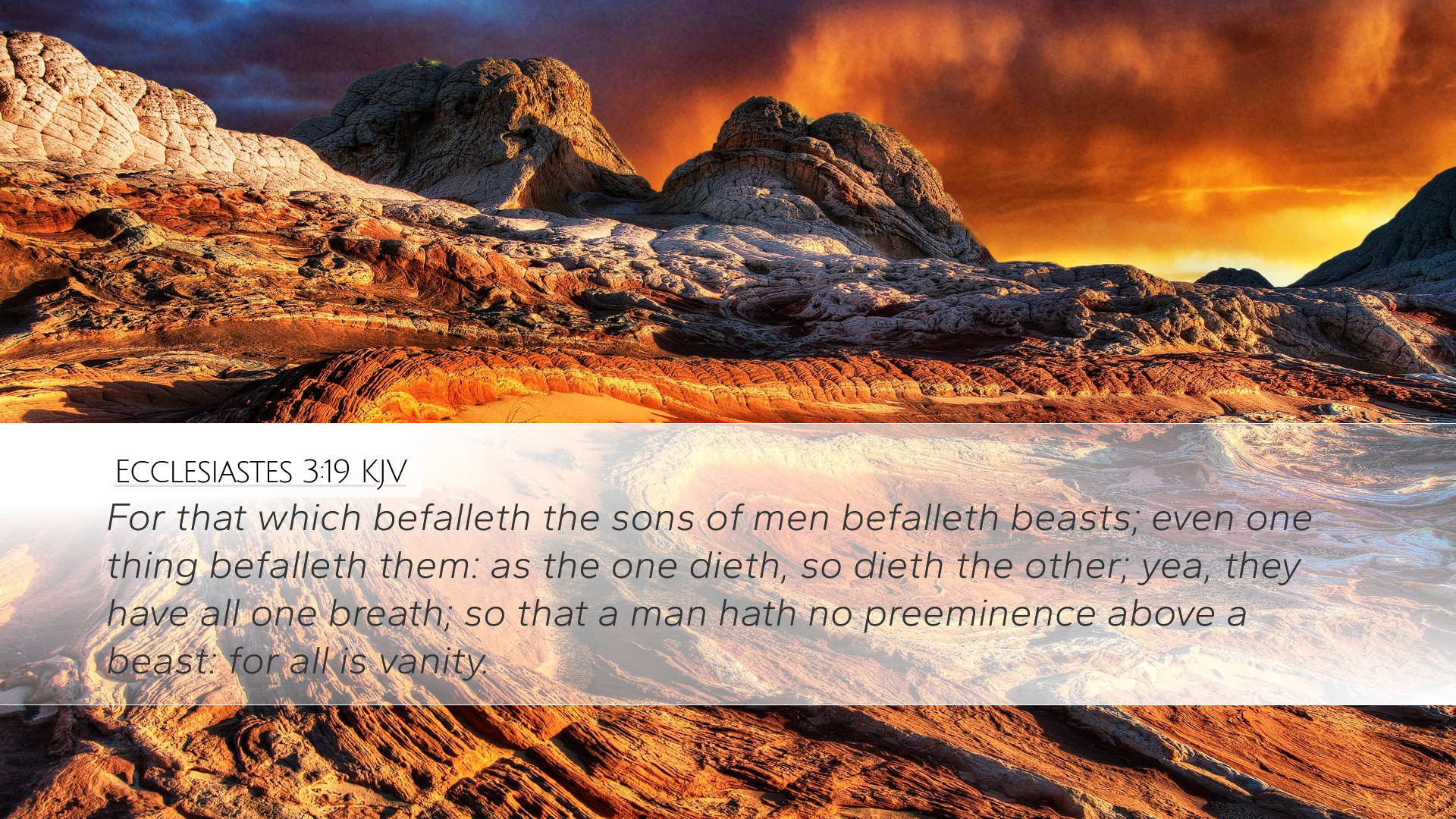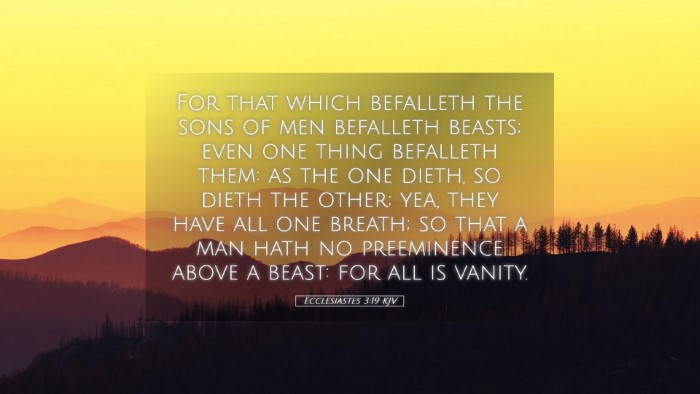Commentary on Ecclesiastes 3:19
Ecclesiastes 3:19 (KJV): "For that which befalleth the sons of men befalleth beasts; even one thing befalleth them: as the one dieth, so dieth the other; yea, they have all one breath; so that a man hath no preeminence above a beast: for all is vanity."
Introduction
The Book of Ecclesiastes presents a profound reflection on the meaning and purpose of life, often confronting the stark realities of existence. Ecclesiastes 3:19 exemplifies this theme by drawing a comparison between humanity and the animal kingdom. This verse stands as a poignant reminder of the common fate that awaits all creatures, emphasizing the transient nature of life.
The Nature of Life and Death
According to Matthew Henry, this verse signifies the universal truth of mortality, applying not only to humans but also to animals. He highlights that life is fleeting, and death is an inevitable conclusion for all living beings. Henry notes that since both man and beast share the same breath of life, they also share the same end, thus nullifying any illusions of superiority among creations of God.
Mortality Shared by All
Albert Barnes provides a thematic interpretation, suggesting that Ecclesiastes 3:19 reminds humanity of its limitations. The equality in death challenges the pride and arrogance that humanity often harbors. Barnes argues that this common fate reiterates a key message of the scriptural narrative: all creation is under the sovereignty of God, and no one is above the other in the grand scheme of existence.
Significance of 'One Breath'
Adam Clarke delves deeper into the phrase "one breath," exploring its implications regarding the essence of life. Clarke posits that both man and animal, being animated by the same divine breath, suggests a profound unity in creation. This perspective serves as a humbling reminder of humanity's reliance on God's sustaining power. While humans may possess intellectual and spiritual distinctions, in the face of mortality, these differences fade.
Vanity and the Pursuit of Meaning
The concluding assertion that "all is vanity" enriches the discourse on human endeavor and purpose. Henry emphasizes that without a recognition of our shared fate with the beasts, human pursuits may become meaningless. This vanity is not merely a cynical perspective but calls believers to seek eternal significance beyond earthly achievements.
- Pursuit of Knowledge: Knowledge and wisdom, while valuable, are rendered hollow if they do not lead to a deeper understanding of one's mortality and need for God.
- Material Wealth: Accumulating wealth and possessions are futile when faced with the inevitability of death, reminding us that true wealth lies in one's relationship with God.
- Legacy and Impact: While humans strive to leave a legacy, Ecclesiastes encourages reflection on what kind of legacy truly matters in light of eternity.
Theological Implications
This verse challenges theological perspectives on the nature of man and the distinction between humanity and animal life. It invites scholars and theologians to explore the implications of shared mortality in the context of creation, sin, and redemption.
Human Responsibility
Recognizing that human life is not superior to animal life promotes a spirit of stewardship over creation. This perspective underscores the biblical mandate to care for all creatures and the environment, reflecting God's love and concern for all forms of life.
The Hope Beyond Mortality
Ultimately, while Ecclesiastes presents a somber reality of life and death, it also points towards a deeper theological hope. The New Testament reveals that through Christ, believers can transcend the vanity and futility described in Ecclesiastes, finding meaning and eternal life beyond earthly existence.
Conclusion
Ecclesiastes 3:19 stands as a critical verse for understanding our place in the created order. It teaches humility in recognizing our mortality and calls forth a greater quest for eternal meaning. As pastors, students, theologians, and Bible scholars meditate on this verse, may they find not only the depth of its meaning but also the transformative power of God's word, leading to a life that honors Him in the face of life's transience.


